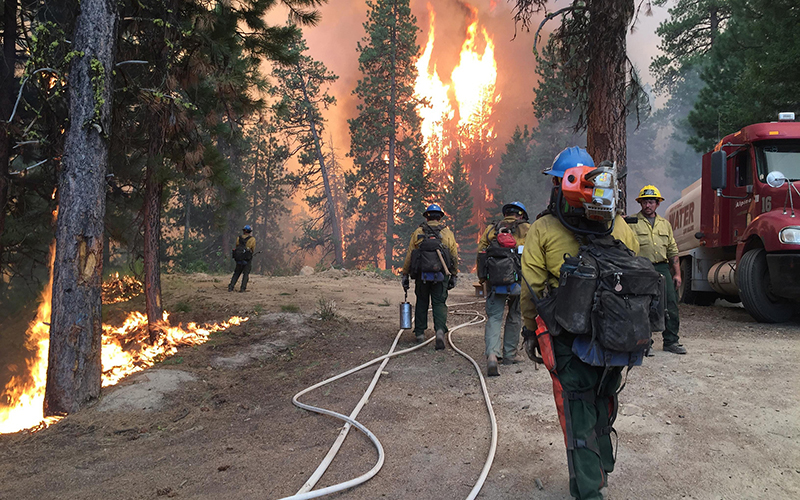
Last year’s wildfire season was much worse comparatively. At this time last year, large fires had burned about 130,000 acres, according to the National Interagency Fire Agencies Southwest Coordination Center. (File photo courtesy of the U.S. Forest Service)
PHOENIX – Wildfires have burned through about 75,000 acres in Arizona already this year, but experts say those numbers aren’t bad compared with last year.
At this time last year, large fires had burned about 130,000 acres, according to the National Interagency Fire Agencies Southwest Coordination Center. The agency considers “large” fires anything that has burned more than 1,000 acres.
Wildfire experts had predicted a widespread fire season this year because of the ongoing drought and the lack of moisture last winter.
“This was the sixth-driest fall and winter season on record, and that is making things tough,” said Brady Smith, spokesman for the Coconino National Forest.
There have been 824 wildfires in Arizona this year, according to the coordination center. Those fires destroyed 74,786 acres, and 98 percent were human-caused.
However, Smith said officials took proactive measures this year by closing parts of national forests early.
“Human fires have dropped because of the closures,” he said. “But every year, we do have people that violate the closure orders.”
Sneaking into a closed forest can cost you: Fines can reach $5,000 for an individual, and an appearance before a federal judge is mandatory.
The Tinder Fire, which broke out in April near Payson, burned 16,300 acres of Coconino National Forest. Officials said it was caused by an illegal campfire that had been abandoned.
Although fires are commonly started by unattended campfires, burning debris on windy days and hot coals from barbecue grills, non-fire sources also can cause disaster.
Officials said a semi-truck dragging a trailer created the sparks that ignited Fire 377 in Apache Sitgreaves National Forest in early June. The sparks started numerous brush fires along a 24-mile stretch of State Route 377 west of Snowflake. The fire eventually burned 4,500 acres and took firefighters the better part of a week to contain.
Arizona’s monsoon season officially starts Friday, according to the National Weather Service. The season often brings much-needed moisture, but with it comes the danger of lightning – the second-leading cause of wildfires in Arizona.
Although the year has started dry, officials predict some rainfall this month, according to the National Oceanic and Atmospheric Administration.
“Even with moisture, lightning is still a big concern for us,” Smith said. The parched winter has made conditions perfect for brush to be ignited naturally.
The Tank Fire, which is still burning near Clints Well, was caused by lightning, according to the Incident Information Center. Firefighters have halted its progress, but a pre-evacuation notice remained in effect Thursday night for those living a few miles north of Clints Well.
The Arizona Department of Transportation has asked motorists to check underneath their vehicles to make sure nothing drags and to monitor low tire pressure, which could create sparks from wheel rims contacting pavement.
ADOT spokeswoman Caroline Carpenter said there were no state highway closures as of Thursday afternoon, but things could change in a hurry. ADOT has real-time updates on highway closures on its Traveler Information site.
If you’re headed into national parks and forests, park rangers are enforcing Stage 2 fire restrictions, which prohibit such activities as campfires, smoking outside an enclosed vehicle and shooting firearms.
This story is part of Elemental: Covering Sustainability, a new multimedia collaboration between Cronkite News, Arizona PBS, KJZZ, KPCC, Rocky Mountain PBS and PBS SoCal.
Connect with us on Facebook.